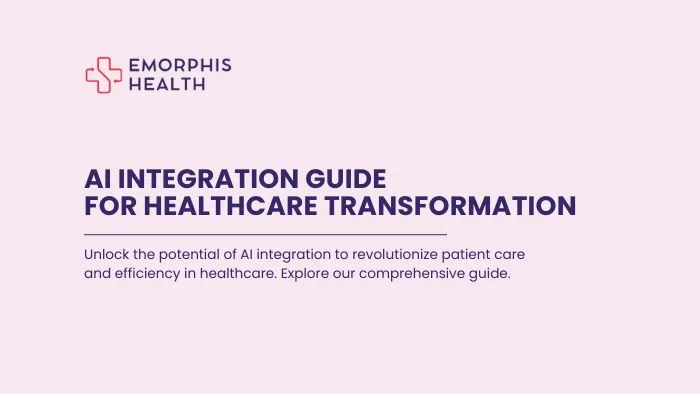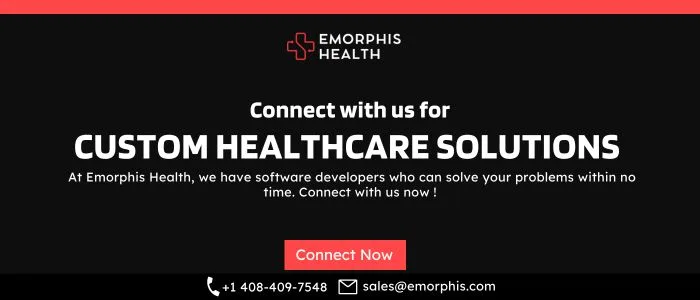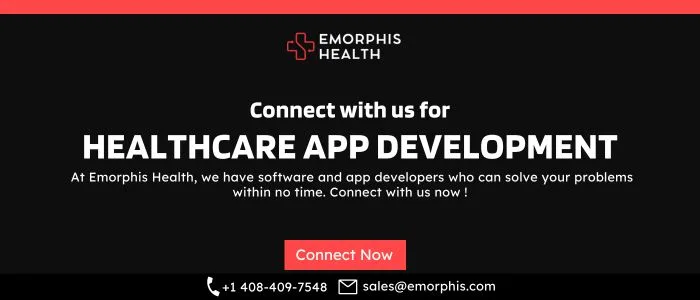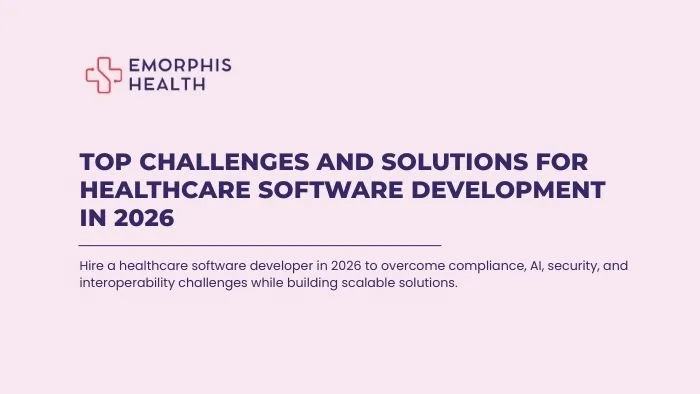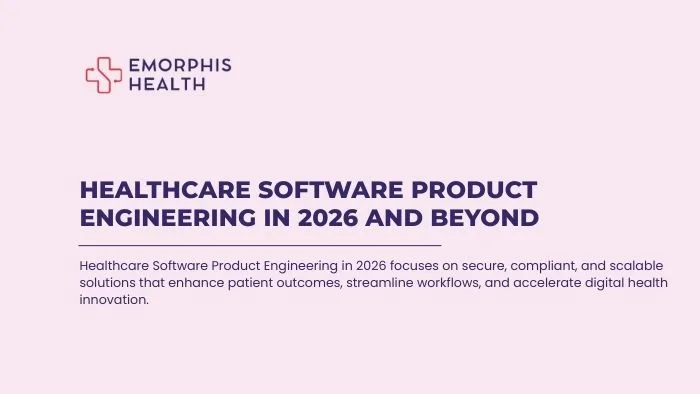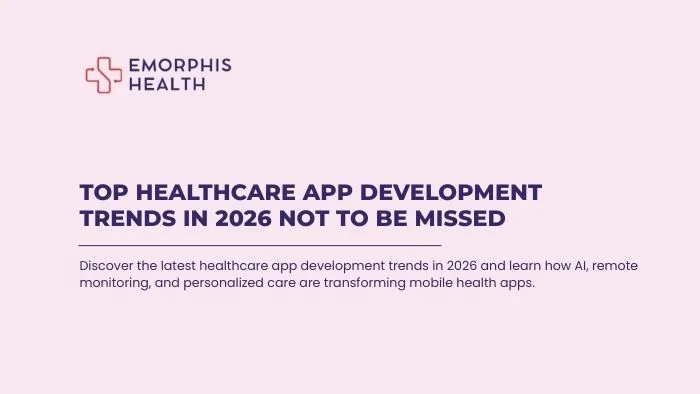Introduction
See Contents
- 1 Introduction
- 2 Understanding AI Integration in Healthcare Software Development
- 3 What will you learn?
- 4 Why Does Healthcare Need AI Integration?
- 5 Top Reasons for Integrating ML and AI Into Healthcare Software Applications
- 6 Top AI Integration Strategies
- 7 Key Components of AI Integration in Healthcare Software
- 8 Use Cases of AI Integration in Healthcare
- 9 How to initiate the AI implementation and integration process into their applications?
- 10 How much does it cost to AI Integration?
- 11 Why Choose Emorphis Health for AI software development and AI Integration services?
- 12 Conclusion
In today’s world, technology plays a big role in how we take care of our health. From doctor’s visits to keeping track of our well-being, healthcare technology is everywhere. But now, there’s something new on the scene that’s changing the game: AI integration.
AI integration stands out as a pivotal strategy for forward-thinking businesses. CompTIA’s IT Industry Outlook 2024 report sheds light on this transformative trend, 22% of firms are boldly embracing AI, infusing it across diverse tech products and workflows, driving innovation to new heights. Meanwhile, 33% are taking cautious steps, engaging in limited AI implementation, recognizing its potential impact. Notably, 45% are in the exploratory phase, signaling a widespread recognition of AI’s significance, yet to fully harness its power.
As the digital frontier expands, those at the forefront of AI integration are poised to lead the charge toward a future defined by efficiency, innovation, and competitive advantage.
Overview of Healthcare Technology
First, let’s take a step back and look at what healthcare technology is all about. Healthcare technology is all about using tools and devices to help us take care of our health in smarter, more efficient ways. It’s not just about going to the doctor anymore. Nowadays, we have a whole array of gadgets and apps that act as our health helpers, making it easier for us to stay on top of our well-being.
We have wearable devices like fitness trackers and smartwatches that monitor our activity levels, heart rate, and even our sleep patterns. Healthcare technology also includes apps and platforms that help us manage our medical records, schedule appointments, and even consult with healthcare professionals remotely.
In essence, healthcare technology is like having a personal health assistant by our side, helping us stay informed, proactive, and empowered when it comes to managing our health.
Find details on AI software development
The AI Revolution
But now, imagine if these health helpers could think and learn on their own. That’s where AI comes in. AI is like having a super smart assistant that can understand medical data, spot patterns, and even make predictions about our health. It’s like having a doctor right in your pocket.
Understanding AI Integration in Healthcare Software Development
So, how does AI fit into all of this?
Well, that’s what we’re here to explore. AI integration in healthcare software development is about finding ways to make AI work together with all the other tech we use to take care of ourselves.
It’s like adding an extra brain to our health helpers, making them even smarter and more useful. And that’s something worth learning more about.
So, let’s dive in and discover the exciting world of AI integration in healthcare.
What will you learn?
In this article, you will learn:
- Why healthcare needs AI integration for improving outcomes, efficiency, and cost-effectiveness.
- The top reasons for integrating ML and AI into healthcare software.
- AI integration strategies, including leveraging AI and best practices.
- Key components of AI integration, such as data infrastructure and model selection.
- Real-world use cases of AI integration in healthcare.
- Common challenges and solutions in AI integration.
- Considerations for initiating AI implementation, cost, and future opportunities in healthcare technology.
Why Does Healthcare Need AI Integration?

Healthcare needs AI integration for many important reasons. First of all, it helps in improving patient outcomes. When AI is used in healthcare, it can help doctors diagnose diseases more accurately and quickly. This means patients can get the right treatment faster, which can save lives.
Moreover, AI can also help in enhancing efficiency. In fact, it can help hospitals and clinics manage their resources better, like scheduling appointments more effectively or predicting when more staff will be needed. This makes the whole healthcare system run smoother.
As a matter of fact, another reason healthcare needs AI integration is to reduce costs. Healthcare can be expensive, but AI can help make it more affordable. For example, AI can analyze large amounts of data to find ways to cut down on unnecessary tests or treatments. This saves money for both patients and healthcare providers.
Now, let’s explore the imperatives driving the need for AI integration in healthcare: improving patient outcomes, enhancing efficiency, and reducing costs.
Top Reasons for Integrating ML and AI Into Healthcare Software Applications
Integrating machine learning (ML) and AI into healthcare software applications is crucial for several reasons. Firstly, it allows for more accurate and faster diagnosis of diseases. AI algorithms can analyze medical data such as X-rays or MRI scans to detect abnormalities that human eyes might miss. This helps doctors make better decisions about treatment options for patients.
Moreover, ML and AI can improve treatment planning and prediction of patient outcomes. By analyzing patient data and medical history, AI can help predict which treatments are likely to be most effective for individual patients. This personalized approach to treatment can lead to better outcomes and faster recovery times.
Furthermore, integrating ML and AI into healthcare software applications can lead to more efficient healthcare delivery. AI-powered chatbots and virtual assistants can help streamline administrative tasks, such as scheduling appointments and answering patient inquiries. This frees up time for healthcare professionals to focus on providing quality care to patients.
In addition, ML and AI can contribute to medical research and development. By analyzing large datasets, AI algorithms can identify trends and patterns that may lead to new discoveries in medicine. This can accelerate the development of new treatments and therapies, ultimately improving patient care.
Overall, integrating ML and AI into healthcare software applications has the potential to revolutionize the way healthcare is delivered, leading to better outcomes for patients and more efficient use of resources.
Top AI Integration Strategies

Integrating AI into various industries, including healthcare, requires strategic planning and implementation to maximize its benefits. Here are some top AI integration strategies:
- Modular Integration: Break down AI capabilities into modular components that can be integrated into existing systems independently. This approach allows for flexibility and scalability, enabling organizations to implement AI functionalities gradually and adapt to changing needs.
- API-Based Integration: Utilize Application Programming Interfaces (APIs) to facilitate seamless integration of AI capabilities into existing software applications. APIs provide standardized interfaces for communication between different systems, making it easier to incorporate AI functionalities without disrupting existing workflows.
- Cloud-Based Integration: Leverage cloud computing platforms to deploy AI solutions and integrate them with existing systems. Cloud-based integration offers scalability, flexibility, and cost-efficiency, allowing organizations to access AI resources on-demand and scale up or down as needed.
- Interoperability Focus: Prioritize interoperability when integrating AI systems with existing infrastructure. Ensure that AI solutions can seamlessly exchange data with other systems, such as Electronic Health Records (EHRs) or Customer Relationship Management (CRM) software, to enable smooth information flow and collaboration.
Few more strategies
- User-Centric Design: Design AI integration with the end-users in mind, considering their needs, preferences, and workflows. Provide user-friendly interfaces and intuitive interactions to ensure smooth adoption and usability of AI-powered tools and applications.
- Data Governance and Security: Implement robust data governance and security measures to protect sensitive information and ensure compliance with regulatory requirements. Establish protocols for data access, usage, and storage to safeguard patient privacy and maintain data integrity.
- Continuous Monitoring and Improvement: Monitor AI integration continuously to assess performance, identify issues, and make necessary improvements. Implement feedback mechanisms and analytics to track key performance indicators (KPIs) and measure the impact of AI integration on organizational goals.
By employing these top AI integration strategies, organizations can effectively incorporate AI capabilities into their operations, drive innovation, and achieve competitive advantage in today’s rapidly evolving digital landscape.
Key Components of AI Integration in Healthcare Software
Integrating AI into healthcare software requires attention to key components:
- Data Infrastructure: Establish robust systems for collecting, storing, and managing healthcare data, ensuring quality and reliability.
- Model Selection and Training: Choose appropriate machine learning algorithms and train them with relevant healthcare data for accurate insights.
- Integration Architecture: Design seamless integration with existing systems like EHRs, prioritizing interoperability and data exchange.
- User Interface and Experience: Develop user-friendly interfaces for healthcare professionals to interact effectively with AI tools, facilitating informed decision-making.
- Security and Compliance: Implement stringent security measures to protect patient data and comply with regulations like HIPAA or GDPR.
- Continuous Monitoring and Improvement: Continuously monitor AI performance, gather user feedback, and iterate for ongoing enhancement and optimization.
By addressing these components, healthcare organizations can successfully integrate AI into their software systems, driving innovation and improving patient care.
Use Cases of AI Integration in Healthcare
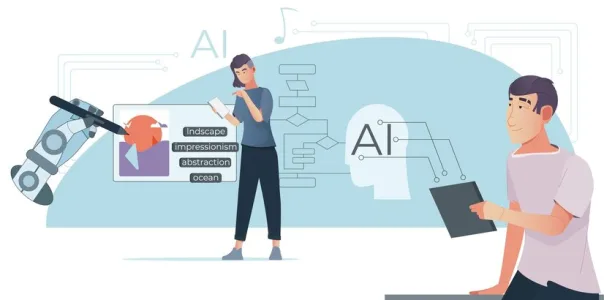
AI integration in healthcare offers numerous applications that enhance patient care, streamline processes, and improve outcomes. Here are some key use cases:
1. Medical Imaging Analysis
AI algorithms analyze medical images such as X-rays, MRIs, and CT scans to assist radiologists in detecting abnormalities, tumors, or other conditions. This helps in faster and more accurate diagnoses, leading to timely treatment and improved patient outcomes.
2. Predictive Analytics for Patient Outcomes
AI predicts patient outcomes by analyzing electronic health records (EHRs), patient history, and other data. It identifies patients at risk of complications or readmission, allowing healthcare providers to intervene early and tailor treatments to individual needs, ultimately reducing healthcare costs and improving patient outcomes.
3. Natural Language Processing for Medical Records
AI-powered natural language processing (NLP) extracts valuable insights from unstructured medical records, such as clinical notes and discharge summaries. It enables efficient data extraction, coding, and analysis, facilitating research, clinical decision-making, and administrative tasks.
4. Personalized Treatment Recommendations
AI generates personalized treatment recommendations based on individual patient characteristics, medical history, and genomic data. It helps healthcare providers choose the most effective treatments and interventions, minimizing adverse effects and optimizing patient outcomes.
5. Telemedicine and Remote Monitoring
AI enables telemedicine and remote monitoring solutions that connect patients with healthcare providers virtually. AI-powered chatbots and virtual assistants triage patient inquiries, schedule appointments, and provide medical advice, extending healthcare services beyond traditional settings and improving access to care, especially in remote or underserved areas.
6. Drug Discovery and Development
AI accelerates drug discovery and development processes by analyzing vast amounts of biomedical data, identifying potential drug candidates, predicting drug interactions, and optimizing clinical trial designs. It reduces the time and costs associated with bringing new drugs to market, ultimately improving treatment options for patients.
7. Personalized Health and Wellness Management
AI-powered wearable devices and mobile apps track individual health metrics, such as activity levels, heart rate, and sleep patterns. They provide personalized health insights, recommendations, and coaching, empowering individuals to make informed lifestyle choices and manage chronic conditions effectively.
By leveraging AI integration in these and other use cases, healthcare organizations can enhance efficiency, improve patient care, and drive innovation in the rapidly evolving healthcare landscape.
Recommend reading about AI in Healthcare for further details.
How to initiate the AI implementation and integration process into their applications?
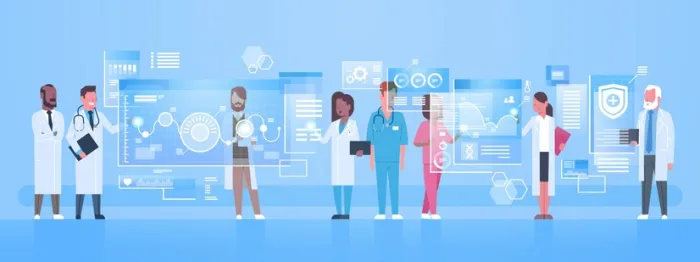
AI Integration Process into Applications
Integrating AI in healthcare applications is a strategic endeavor that requires careful planning and execution. Here are steps healthcare organizations can take to initiate the AI integration process effectively:
a. Define Objectives and Expectations
Begin by clearly defining the objectives and expectations for integrating AI into healthcare applications. Identify the specific goals and outcomes the organization aims to achieve through AI integration, such as improving diagnostic accuracy, enhancing operational efficiency, or enhancing patient engagement.
b. Assess Readiness and Resources
Evaluate the organization’s readiness and resources for AI integration. This includes assessing the availability of data, technology infrastructure, expertise, and budgetary considerations. Determine any gaps or limitations that need to be addressed to support successful AI integration.
c. Establish Stakeholder Engagement
Engage stakeholders across the organization, including clinicians, IT professionals, administrators, and end-users, in the AI integration process. Solicit input, gather requirements, and foster collaboration to ensure that AI solutions align with the needs and priorities of all stakeholders.
d. Develop a Strategic Roadmap
Develop a strategic roadmap outlining the key steps, milestones, and timelines for AI integration. Break down the integration process into manageable phases, prioritize initiatives based on strategic importance and feasibility, and allocate resources accordingly.
e. Identify Use Cases and Pilot Projects
Identify specific use cases and pilot projects for AI integration to demonstrate value and feasibility. Select use cases that align with organizational objectives and have the potential for a significant impact on patient care or operational efficiency. Pilot projects allow organizations to test AI solutions in real-world settings, gather feedback, and iterate before scaling up integration.
f. Invest in Training and Education
Invest in training and education to build AI capabilities among staff and end-users. Provide comprehensive training programs to ensure that personnel have the necessary skills and knowledge to effectively utilize AI-powered tools and applications. Foster a culture of continuous learning and innovation to support ongoing AI integration efforts.
g. Establish Governance and Oversight
Establish governance structures and processes to oversee the AI integration process and ensure alignment with organizational goals and values. Define roles and responsibilities, establish clear accountability mechanisms, and implement policies and procedures to govern AI use, data privacy, and ethical considerations.
By following these steps, healthcare organizations can effectively initiate the AI integration process into their applications, paving the way for transformative advancements in patient care and organizational performance.
How much does it cost to AI Integration?
The cost of AI integration can vary widely depending on several factors, including the complexity of the project, the scope of integration, the level of customization required, and the expertise of the AI developers and consultants involved. Here are some key factors that can influence the cost of AI integration:
i. Development and Implementation Costs
This includes the cost of developing and implementing AI algorithms, models, and software solutions tailored to the specific needs and requirements of the healthcare organization. Development costs may vary based on factors such as the complexity of AI algorithms, the amount of data processing required, and the integration with existing systems.
ii. Data Acquisition and Preparation
Acquiring and preparing healthcare data for AI integration can incur additional costs. This may include the cost of acquiring medical datasets, data preprocessing, and cleaning, and ensuring data quality and compliance with regulatory standards such as HIPAA (Health Insurance Portability and Accountability Act).
iii. Infrastructure and Technology Costs
AI integration may require investment in infrastructure and technology to support AI-powered applications and systems. This includes the cost of hardware, such as servers and GPUs (Graphics Processing Units), as well as software tools and platforms for AI development, deployment, and management.
iv. Training and Education Costs
Training staff and end-users on AI-powered tools and applications may incur additional costs. This includes the cost of AI training programs, workshops, and educational materials to ensure that personnel have the necessary skills and knowledge to effectively utilize AI technologies.
v. Maintenance and Support Costs
Ongoing maintenance and support of AI-integrated systems may require additional investment. This includes the cost of monitoring system performance, troubleshooting issues, and implementing updates and improvements to ensure optimal functionality and reliability over time.
vi. Consulting and Professional Services
Healthcare organizations may need to engage AI consultants, developers, and experts to provide guidance and support throughout the AI integration process. The cost of consulting and professional services may vary based on factors such as the level of expertise required, the duration of engagement, and the scope of services provided.
Overall, the cost of AI integration in healthcare can range from tens of thousands to millions of dollars, depending on the specific requirements and complexities of the project. It’s essential for healthcare organizations to carefully evaluate their needs, budgets, and resources and work with experienced AI developers and consultants to develop a cost-effective and sustainable AI integration strategy.
Why Choose Emorphis Health for AI software development and AI Integration services?
Choosing Emorphis Health for AI software development and integration services in healthcare offers several advantages. Firstly, with extensive expertise and experience in the field, Emorphis Health delivers customized AI solutions tailored to the unique needs of healthcare organizations.
Additionally, their commitment to quality and reliability ensures that AI solutions meet the highest standards of performance and security. Moreover, Emorphis Health prioritizes compliance with regulatory standards like HIPAA and GDPR, ensuring data privacy and confidentiality.
Through a collaborative approach, Emorphis Health works closely with clients to understand their objectives and deliver solutions that align with their vision. Furthermore, Emorphis Health provides continuous support and maintenance, ensuring that AI solutions remain optimized and effective over time.
Overall, choosing Emorphis Health for AI software development and integration services empowers healthcare organizations to leverage AI technologies effectively to drive innovation and improve patient care.
Find details on AI software development
Conclusion
In conclusion, the integration of artificial intelligence (AI) into healthcare software represents a pivotal opportunity for healthcare organizations. This opportunity allows them to revolutionize patient care, streamline processes, and drive innovation.
Transitioning towards AI integration is not only crucial but also inevitable. It empowers healthcare providers to harness the full potential of AI technologies, such as machine learning, natural language processing, and predictive analytics. Throughout this guide, we’ve extensively explored the imperatives driving the need for AI integration in healthcare.
Additionally, we’ve highlighted the urgency to adapt to evolving healthcare demands. Moreover, we’ve delved into the top reasons for integrating AI into healthcare software applications. Emphasizing its transformative impact on diagnostic accuracy, personalized treatment plans, and operational efficiency.
By adopting strategic AI integration strategies and overcoming common challenges, healthcare organizations can embark on a transformative journey. This journey leads towards enhanced patient outcomes and organizational excellence. Embracing AI integration is a necessity and an opportunity to lead the way in delivering cutting-edge healthcare solutions.
With the right partner like Emorphis Health, organizations can navigate the complexities of AI integration with confidence. They can ensure compliance, quality, and ongoing support. As the healthcare landscape continues to evolve, AI integration will play a pivotal role. It will shape the future of patient care, driving positive outcomes, and empowering healthcare professionals to deliver exceptional services.
Further, find the details on A Guide for Developing Chatbots in Healthcare

